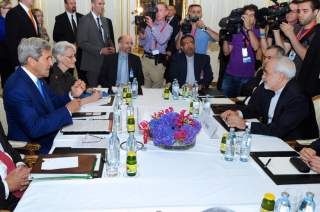Why There Won't Be a Nuclear Grand Bargain with Iran
"The United States and its partners in the P5+1 should instead work toward a series of interim agreements using the JPOA as a model, with each successive accord building on the last."
The Joint Plan of Action (JPOA) agreed upon by Iran and the P5+1 (the five permanent UN Security Council members plus Germany) in November 2013 is rapidly approaching its July 20 expiration date without a comprehensive agreement to resolve the nuclear dispute in sight. The JPOA, which was intended to serve as a six-month interim measure during which a lasting accord could be negotiated, largely keeps Iran from advancing its nuclear program. If the JPOA expires without a comprehensive deal or a renewal of the existing one, these restrictions on Iran’s program will be removed.
Recently, signs of a compromise on the disposition of Iran’s heavy-water reactor at Arak have increased expectations that a comprehensive deal might be achieved at the eleventh hour. Unfortunately, this seems to be wishful thinking.
In reality, the two sides remain far apart on fundamental issues such as Iran’s centrifuge program. The United States remains deeply concerned about Iran’s nuclear “breakout” potential—the possibility that Iran could rapidly produce the fissile material necessary for a nuclear bomb. According to Secretary of State John Kerry, with its existing enrichment facilities Iran could produce enough highly enriched uranium for a bomb in two months. Kerry believes this timeframe needs to be extended substantially. Although the United States has accepted an Iranian enrichment program in principle, any deal that does not mandate major cuts to Iran’s enrichment capacity will therefore be a nonstarter in Washington. The American position, however, conflicts considerably with Iran’s insistence on maintaining the program’s current enrichment capacity, and even to gradually increase it. Ali Akbar Salehi, the head of Iran’s Atomic Energy Organization, has recently stated his country will require 50,000 or even 100,000 centrifuges to satisfy Iran’s nuclear energy needs (currently it has less than 20,000).
Nor are centrifuges the only sticking point. The United States and its allies also insist on limits to Iran’s missile development, and that Iran make significant progress with IAEA toward resolving outstanding questions about the “possible military dimensions” of its nuclear program. Each of these issues alone presents enormous negotiating challenges. Consideration of them together makes a comprehensive deal seem very unlikely, even if the JPOA is extended for an additional six months. In fact, considering the electoral calendar in the United States and the increasing pressure from conservatives in Iran, domestic constraints on both sides could make compromise even more difficult in the future than it is now.
The United States should avoid making the perfect deal the enemy of a good one.
Rather than continuing with the current objective of a comprehensive grand bargain, the United States and its partners in the P5+1 should instead work toward a series of interim agreements using the JPOA as a model, with each successive accord building on the last. Such a gradual, incremental approach offers a better chance of ultimately resolving the nuclear dispute, at a lower risk of the existing deal falling apart. It would also make it easier for the White House to offer Iran sanctions relief, as additional relief from oil and other sanctions can be provided by presidential waiver. A comprehensive deal, on the other hand, would likely require positive action by Congress, which under present circumstances is unlikely.
A deal that left Iran with little or no enrichment capability would obviously be better for the United States, but this is unlikely to happen. Critics might argue that a return to a more coercive U.S. strategy would be preferable to a flawed deal that left Iran’s program mostly intact. Tough, multilateral sanctions may have helped get Iran to the negotiating table, but the United States is unlikely to command sufficient international support to coerce Iran into accepting harsher terms. More likely, negotiating failure would lead Iran to advance its program faster and further than ever, leaving the United States with few alternatives to either military force or acceptance. For those whose first policy choice has always been military force, this is an ideal path. For those who believe a diplomatic settlement stands a better chance of preventing a nuclear-armed Iran over the long term, it is important to stick to demands that can realistically be met.
Sven-Eric Fikenscher is a Research Fellows with the International Security Program and the Project on Managing the Atom at Harvard University’s John F. Kennedy School of Government.
Robert Reardon is a Research Fellows with the International Security Program and the Project on Managing the Atom at Harvard University’s John F. Kennedy School of Government.

